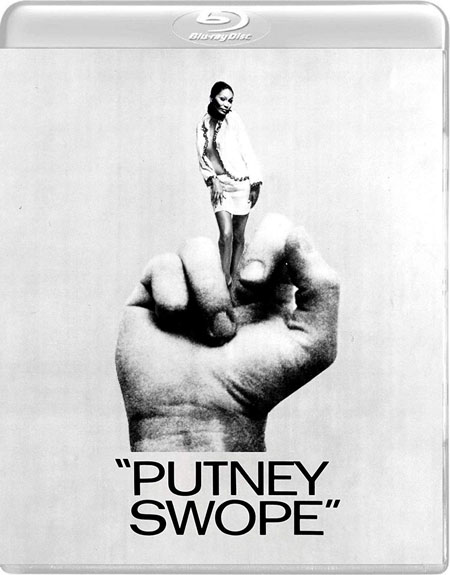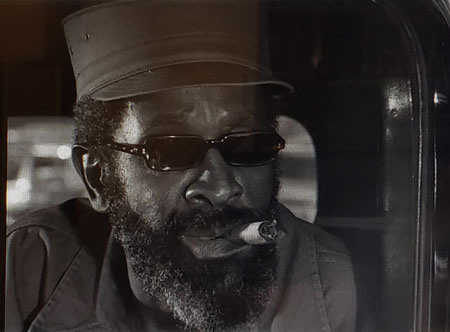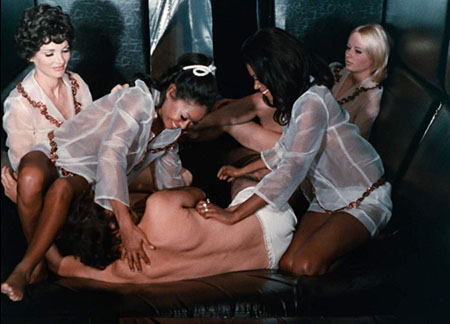
BY LEE PFEIFFER
The year 1969 was an extraordinarily good one for movies. In addition to some of the best major studio releases of all time, the year also saw some innovative independent films. Among the most consequential was "Putney Swope", directed by Robert Downey (now known as Robert Downey Sr. to differentiate him from his offspring, the popular leading man.) Downey is an unapologetic liberal who thrived during the counter-culture revolution of the late 1960s. "Putney Swope" seemed to be the kind of avante garde filmmaking that would never see a wide release. The film was shot almost entirely in black-and-white during a period in which the format had been deemed uncommercial for years. He also took some broadside shots at the sacred cows of American capitalism.The movie was saved from oblivion by the owner of the Cinema V theater chain who was enthusiastic about the script and Downey's disregard for conventional opinions. Because Cinema V owned enough theaters to give the film a wide release, it ensured that the critics and public would at least be aware of its existence. No one foresaw that the film would become a highly acclaimed commercial hit. In the process, the film's poster depicting a white hand giving the middle finger salute (with a black woman symbolizing the offending digit) became a iconic image. The cast was largely unknown at the time but some of actors went on to varying degrees of fame (Allen Garfield, Allan Arbus, Antonio Fargas, Stan Gottlieb.)
The film opens with a striking scene in which a helicopter lands in New York City. A man who appears to be an uncouth biker-type emerges carrying a briefcase and he's met by a senior executive from an advertising firm. At a board meeting, the man who arrived by helicopter informs the executives that the beer they are marketing is worthless and that beer itself is only loved by men with sexual inadequacies. He then promptly departs. This is only the beginning of a very strange journey. Soon, the hapless ad men are squabbling over whether to heed the advice or not. Then the megalomaniac who owns the agency arrives to address them, only to keel over and drop dead on the conference table. Top executives immediately rifle through his pockets and rob him of any valuables before voting on who should be the next chairman. Through an unintended fluke, the choice proves to be Putney Swope (Arnold Johnson), a middle-aged token African-American who relishes now being in charge of an agency that symbolizes hypocrisy and greed. Swope loses no time in making sweeping changes in accordance with bringing about social reforms. He fires most of the white workers and replaces them with an eclectic group of black executives, none of whom seem remotely qualified for the tasks at hand. Swope renames the business as the Truth & Soul Agency and launches outrageous ad campaigns that are designed to offend everyone. In ads for an airline, female flight attendants are depicted dancing topless and sexually assaulting male customers. In a sweetly filmed commercial, a young interracial couple sing romantically about dry-humping. Ironically, the strategies work and Truth & Soul is making millions from clients who consider Putney to be a messiah of advertising. Soon, he's living the high life, espousing socialist/communist rhetoric and even dressing like Fidel Castro. However, Putney becomes aware of the fact that even his hand-chosen minority employees are not immune from greed and corruption. At home, his new diva-like wife takes pleasure in abusing their white servant girl. What's the message behind all this? Who knows. Perhaps Downey is simply trying to say that capitalism corrupts across racial lines. In any event, the film ends on a bizarre, cynical note. Oh, and did I mention the casting of little people as the corrupt and perpetually horny President of the United States and First Lady who host group sex encounters?

"Putney Swope" is a brazen and entertaining film even though the script is erratic and scattershot. Much of it is tame by today's standards but the film pushed the envelope back in 1969. (I don't believe it was ever formally given a rating but it was considered to be "Adults Only" fare by most theaters.) Much of the credit for the movie's unique look must go to cinematographer Gerald Cotts, who had never shot a feature film before. He gets some striking shots and, to emphasize the impact of Putney's offensive TV commercials, these are the only scenes that are shown in color. The performances are uniformly amusing and Arnold Johnson makes for a compelling protagonist even though Downey ended up dubbing his voice with his own, ostensibly because he said Johnson couldn't remember his lines. Some of the gags fall flat and the film as a whole is a mixed bag but there is no denying that it represents the epitome of American independent filmmaking from this era.

Vinegar Syndrome has scored a coup by gaining the video distribution
rights to the film, which has been named to the National Film Registry
of important American movies. The film has been jointly restored by the
Academy of Motion Picture Arts and Sciences, Martin Scorsese's Film
Foundation and a grant from George Lucas and family. The pristine
transfer does great justice to Gerald Cotts' stark B&W
cinematography. The dual format (Blu-ray/DVD) release also features an
abundance of extras:
- There are two feature length commentary tracks. The first is with
director Downey, who reiterates many of the points made in video
interviews in the package. The other is an informative and interesting
track by film historian Sergio Mimms.
- Audio interview with Gerald Cotts
- 2001 and 2008 video interviews with Downey as well as what appears
to be fan-shot footage of Downey engaging in an informal Q&A with
audience members following a 2005 screening of the movie at the
Philadelphia Film Festival. In both, Downey recalls the unpromising
prospects for distribution of the film and his gratitude that it was
given a wide release. He also bemoans the fact that it was his only
feature film to enjoy that luxury. His laid-back, unassuming style makes
for engaging interviews. Curiously, however, for a progressive who
essentially made a Black Power-themed film, Downey never refers to the
star of the film by his name, Arnold Johnson, preferring to simply call
him "the actor who..." . During these interviews, Downey credits Jane
Fonda for promoting the film during a 1969 appearance on "The Tonight
Show with Johnny Carson", which caused the public to seek it out and
make the movie a boxoffice hit. He also all but disowns some low-brow
mainstream comedies he did for major studios, saying he made them only
because he needed the money.
- Original trailer
- There is also a very impressive gallery of still photos, newspaper
articles and poster campaigns from the film. It's amusing to see how
many local theaters opted to optically censor the image of a woman
representing the middle finger in the ad campaign, thus rendering the
resulting ad image largely meaningless.
This is a highly impressive release. The good folks at Vinegar
Syndrome often get pigeon-holed for their commendable efforts to restore
and make available vintage porn films. This release shows, however,
that there is more to the company than just erotica. Highly recommended.
CLICK HERE TO ORDER FROM AMAZON
